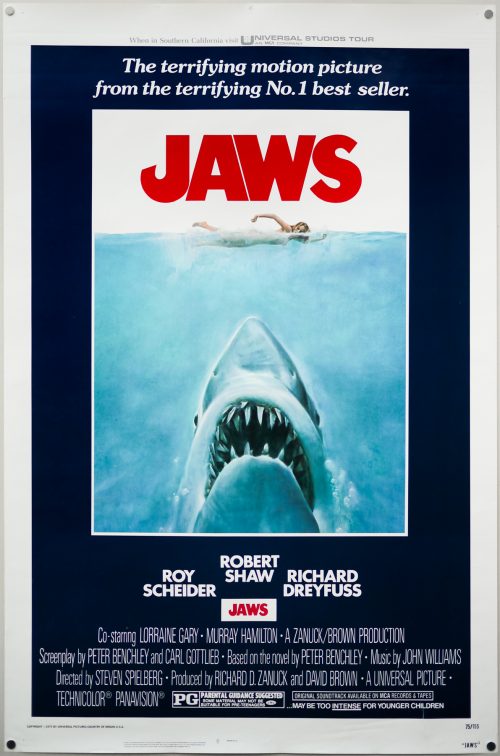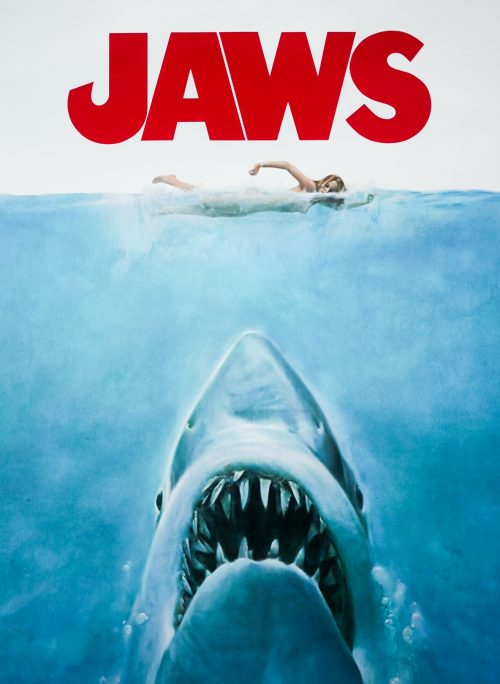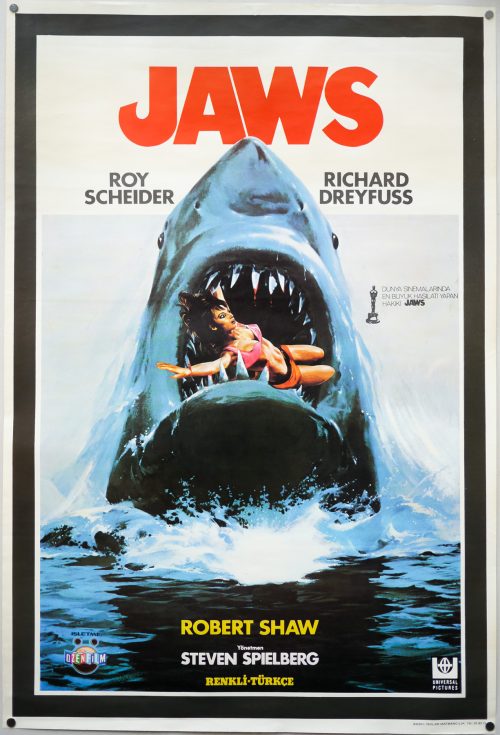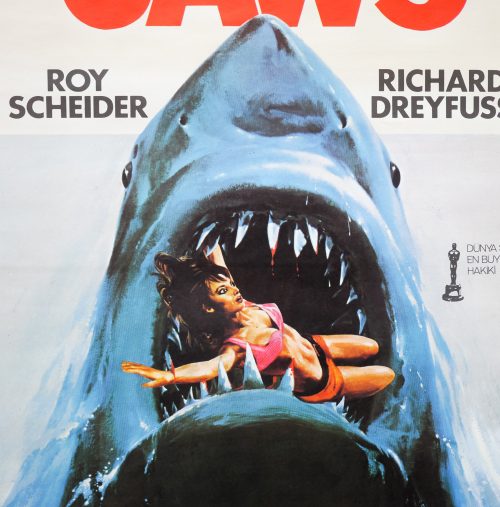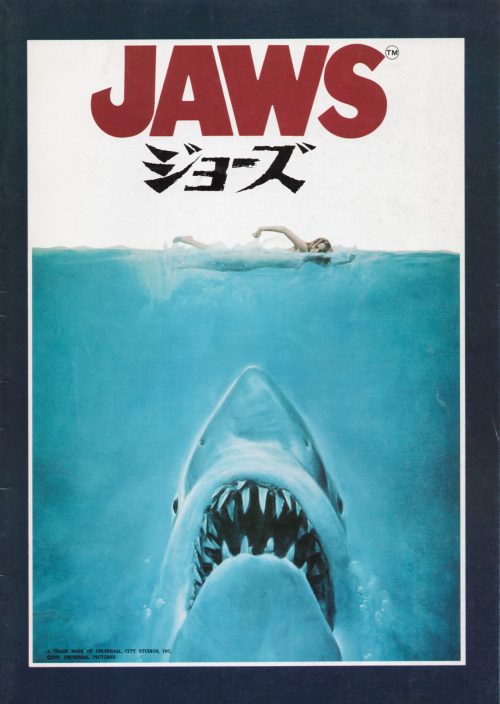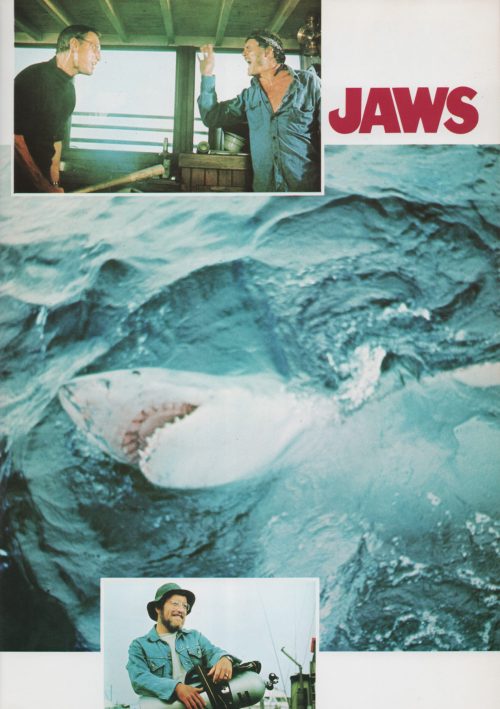- Title
- Jaws
- AKA
- Les dents de la mer [The teeth of the sea] (France)
- Year of Film
- 1975
- Director
- Steven Spielberg
- Starring
- Roy Scheider, Robert Shaw, Richard Dreyfuss, Lorraine Gary, Murray Hamilton, Carl Gottlieb, Jeffrey Kramer, Susan Backlinie
- Origin of Film
- USA
- Genre(s) of Film
- Roy Scheider, Robert Shaw, Richard Dreyfuss, Lorraine Gary, Murray Hamilton, Carl Gottlieb, Jeffrey Kramer, Susan Backlinie,
- Type of Poster
- One sheet
- Style of Poster
- --
- Origin of Poster
- USA
- Year of Poster
- 1975
- Artist
- Roger Kastel
- Size (inches)
- 27 1/16" x 41"
- SS or DS
- SS
- NSS #
- 75/155
- Tagline
- The terrifying motion picture from the terrifying No.1 best seller
I’ve waited many years to add this iconic one sheet for Steven Spielberg’s masterpiece Jaws to the Film on Paper collection as I wanted to find a rolled copy, which is no meant feat considering the film’s popularity and the fact that it was released in the mid-1970s (rolled posters from this period are rare). I finally won this copy in an auction earlier this year and what’s notable is that when other rolled originals of Jaws appear they almost always have the same NSS information layout at the bottom as this one, which many dealers and collectors believe means they originate from the Cleveland, Ohio NSS office. CineMasterpieces have a number of Jaws one sheets in their inventory (many already sold) and you can compare the different layouts of the NSS information (here’s an example).
The instantly recognisable image was painted by the American artist Roger Kastel and was originally commissioned for the paperback cover of Peter Benchley’s novel, but when Universal saw the artwork they bought the rights to use it for the poster and following the worldwide success of the film it would go onto become one of the most imitated and parodied images of all time, as well as a merchandising product in its own right.
Collector’s Weekly published a fascinating article about the creation of the poster and the events that led up to Kastel being commissioned to work on the poster. The artist recalls the day the project dropped into his lap:
“I had just delivered a painting to Bantam’s art director, Len Leone,” he says. “Bantam was just loaded with great artists at that time, and Len really gave Bantam its look. I was sitting in Len’s office when Oscar Dystel, Bantam’s publisher, came in. He said, ‘Wait a minute. Don’t leave. I have a great book for you to read’. And he ran out and came back with ‘Jaws.’”
A cover had already been painted by the renowned book cover illustrator for the Doubleday hardback edition of the book but as Kastel remembers it Dystel wasn’t happy with the first cover:
“He wanted me to read the book to pick out a new part to illustrate. But, of course, the best part was the beginning, where Chrissie goes into the water nude.” Turns out the Doubleday concept, if not the execution, was not so bad after all. Kastel did a sketch for Dystel and Leone to critique. “The only direction Oscar and Len gave me was to make the shark bigger, and very realistic.”
Kastel visited his usual go-to source for reference material, the Museum of Natural History in New York, but came up short:
“They didn’t have anything I could use, so I asked if they had a shark exhibit. They said they did but that it was closed for cleaning. It was lunchtime, so I went upstairs anyway, and there were all these different stuffed sharks, just laying on boards. I had my camera with me so I took a few pictures. The shark in my painting developed from there. I just tried to paint a ferocious-looking shark that was still realistic.”
When the book was released the graphic nature of the image saw the paperback banned from shelves in Boston, Massachusetts, and St. Petersburg, Florida, but Bantam didn’t mind the publicity as it greatly boosted sales. The cover also caught the attention of the film studio who were developing the story for the big screen:
“Apparently Universal had tried other poster ideas, but in the end they picked mine. They changed the color of the ‘JAWS’ lettering, added the actor names and other credits, and blurred the girl’s breasts with some foam.”
Kastel is unsure what fate befell the original oil painting (which was approximately 20″ x 30″) and the last time he saw it was when the paperback was first released:
“It was hanging at the Society of Illustrators in New York,” he says. “It was framed because it was on a book tour, and then it went out to Hollywood for the movie. I expected it to come back, but it never did. Either someone has it or it’s lost in storage at Universal. They really should report it as stolen.”
I’ve credited the design of the poster to three parties, although Tony Seiniger (and his agency) is most often cited as the man behind it. This article on Posterwire features comments that also call out another agency called Magidell who apparently had input as well as Universal’s in-house marketing team. Kastel also painted the ‘Gone with the Wind’ style one sheet for The Empire Strikes Back. Check out his official site here.
